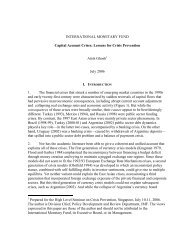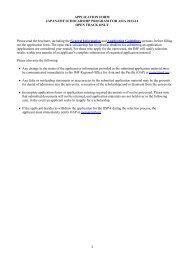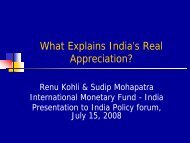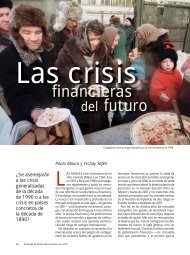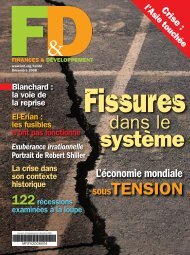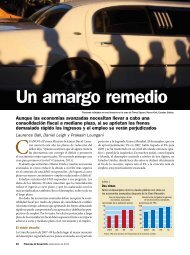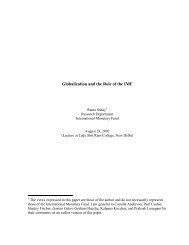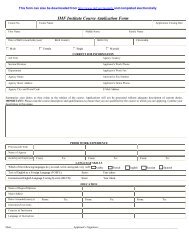Chapter 20: Taxation of Corporate Reorganizations - IMF
Chapter 20: Taxation of Corporate Reorganizations - IMF
Chapter 20: Taxation of Corporate Reorganizations - IMF
You also want an ePaper? Increase the reach of your titles
YUMPU automatically turns print PDFs into web optimized ePapers that Google loves.
Tax Law Design and Drafting (volume 2; International Monetary Fund: 1998; Victor Thuronyi, ed.)<br />
<strong>Chapter</strong> <strong>20</strong>, <strong>Taxation</strong> <strong>of</strong> <strong>Corporate</strong> <strong>Reorganizations</strong><br />
this rule is applied, a practical problem may arise with some categories <strong>of</strong> shares, which may be<br />
voting or nonvoting from time to time. For example, preferred shares may normally be<br />
nonvoting as long as the preferred dividend is paid out, but may become voting when the<br />
company fails to pay out the guaranteed preferred dividend. In such a case, the common shares,<br />
which are normally voting shares, may become nonvoting. To know whether shares are voting<br />
shares, the situation should be judged as it is in fact at the time <strong>of</strong> the reorganization. If preferred<br />
shares are voting at that time, such shares should be considered as voting shares. If common<br />
shares are nonvoting at that time, they should be considered as nonvoting shares. However,<br />
when these different categories <strong>of</strong> shares are distributed, it should be taken into account that<br />
preferred shareholders may lose control and that common shareholders may gain control some<br />
time after the reorganization. 60<br />
5. Step Transaction Doctrine<br />
When the conditions for a tax-free reorganization are so narrow that, in some cases,<br />
unavoidable changes in the business activity or the necessity to buy out shareholders will result<br />
in taxation <strong>of</strong> the reorganization, the question arises as to whether the parties can do after or<br />
before the reorganization what the law prohibits them from doing at the time <strong>of</strong> the<br />
reorganization. If the parties can get rid <strong>of</strong> unwanted assets by selling them or transferring them<br />
to a different company before or after the reorganization, the problems in qualifying for a taxfree<br />
reorganization are more apparent than real. The same principle applies to the redemption <strong>of</strong><br />
minority shareholders' interests.<br />
The U.S. reorganization rules, which are rather flexible for changes at the time <strong>of</strong> the<br />
reorganization, are generally rather inflexible before and after; that is, the same restrictions that<br />
apply at the time <strong>of</strong> the reorganization also apply before and after it. This is the result <strong>of</strong> the<br />
application <strong>of</strong> the "step transaction doctrine" in case law. 61 Under this doctrine, different<br />
transactions before and after the reorganization are considered to be "single steps" <strong>of</strong> the overall<br />
transaction if it appears that they were necessary and indispensable steps to reach a general<br />
agreement on the reorganization. Therefore, sales <strong>of</strong> assets or shares before or after the<br />
reorganization will be taken into account in determining whether the continuity requirement has<br />
been met, when it appears that these sales were implemented as part <strong>of</strong> the overall reorganization<br />
agreement.<br />
Countries with very strict rules on continuity traditionally have not had such a step<br />
transaction doctrine. 62 This diversity <strong>of</strong> experience suggests a choice between, on the one hand, a<br />
60 The line cannot always be drawn very neatly. See Forrest Hotel Corporation v. Fly, 112 Supp. 782 (S.D. Miss.<br />
1953).<br />
61 U.S. American Potash & Chemical Corporation v. U.S., 399 F.2d 194 (Ct. Cl. 1968), Commissioner v. Gordon 391<br />
U.S. 83 (1968); Furniss v. Dawson [1984] 2 WLR 226; [1984] AC 474. Similarly, in the Netherlands, tax<br />
exemption is subject to the condition that the shares issued by the transferee company in the merger are not sold by<br />
the shareholder for three years after the merger, see NLD Vpb § 14(1).<br />
62 A typical case in point is Belgium before its tax reform <strong>of</strong> 1989. Tax-free reorganizations were an all-or-nothing<br />
affair, whereby all assets had to be transferred exclusively in exchange for voting stock. However, parties to the<br />
- 18 -





